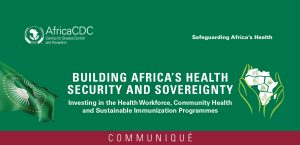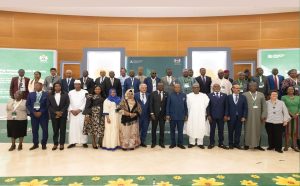African heads of state have made a commitment to accelerate investment, cross-border coordination, and vaccine access to eliminate cholera by 2030.
In response to a call by Africa CDC and under the leadership of H.E. Hakainde Hichilema, President of Zambia and African Union Champion on Cholera, 10 African Heads of State, ministers from 20 countries, and global partners – including the World Health Organization, UNICEF, Gavi, the Vaccine Alliance, The Global Fund, and the Gates Foundation – convened to chart a unified path towards cholera elimination by 2030.
“One response plan and one accountability framework are essential, especially given the challenges we face today. We need a model that ensures coordination and delivers impactful, continent-wide results,” said President Hichilema.
The leaders issued a collective call to action in response to rising cases, preventable deaths, and the disease’s socio-economic toll.
“The people of Africa are watching. They expect bold, coordinated and unwavering leadership that puts their health and dignity first. This crisis demands action at the highest political level,” said H.E. Mahmoud Ali Youssouf, Chairperson of the African Union Commission, who called for bold leadership and systemic change.
“Only through the direct engagement of our Heads of State can we drive the elimination of cholera by 2030. This requires a continental shift—strong national leadership, domestic investment, integrated national actions, and regional coordination. We must also break the cycle of dependency by accelerating vaccine manufacturing and ensuring equitable access to life-saving tools,” he said.
The leaders called for strengthening a Presidential Task Force on Cholera to drive multisectoral coordination, mobilise emergency resources, enhance cross-border surveillance, and enforce accountability mechanisms across key ministries.
As of May 2025, Africa accounts for 60% of all reported cholera cases and 93.5% of related deaths, with Angola, the Democratic Republic of Congo (DRC), Sudan and South Sudan among the most affected.
Dr Jean Kaseya, Director General of Africa CDC, attributed the increase in cases to weak interministerial coordination. “There is a fragmented response across key sectors—health, water, sanitation, and energy—alongside low community engagement, major gaps in cross-border surveillance, declining financial resources, and underinvestment in WASH infrastructure,” he said.
“If you look at eastern DRC, it’s heavily impacted by cholera and population movement,” Dr Kaseya added. Vaccine shortages and limited access to critical supplies are compounding the crisis. Africa requires 504 million oral cholera vaccine doses but currently receives only 20–26 million.
H.E. Félix Tshisekedi, President of the Democratic Republic of Congo (DRC), expressed solidarity with neighbouring countries facing cholera surges.
“The DRC stands ready to support efforts to strengthen regional coordination and response initiatives, through increased domestic financing, local production of cholera vaccines across Africa, and the establishment of sustainable water, sanitation and hygiene (WASH) systems in each country, including cross-border measures to ensure a robust and people-centred response.”
H.E. Dr Netumbo Nandi-Ndaitwah, President of Namibia, said her country has recorded zero cholera cases since 2014 but remains vigilant. Namibia’s National Multi-Hazard Emergency Preparedness and Response Plan (NMHEPRP), launched in 2025, identifies cholera among 12 national hazards. “We’ve strengthened monitoring of water resources and are building the capacity of our healthcare workforce,” she said, affirming Namibia’s readiness to collaborate with AU Member States and global partners.
“We cannot afford to be complacent,” said H.E. John Mahama, President of Ghana, whose country saw over 7,000 suspected cholera cases this year, with 619 laboratory-confirmed cases. “If COVID taught us anything, it’s that public health emergencies expose and amplify existing inequalities. We must not let history repeat itself.”
He urged leaders to view this crisis as a catalyst for action towards Agenda 2063, emphasising that “every African, regardless of geography or status, deserves access to safe water, health care, and dignity.”
When it comes to cholera, Malawi has learned the hard way. “We cannot afford to let our guard down,” said H.E. Lazarus Chakwera, President of Malawi. For two decades, Malawi had no major outbreaks. “But we learned that it’s not enough to contain cholera within our borders. A single lapse in a neighbouring country, or a disaster affecting our water infrastructure, can trigger a national crisis.”
In 2022, six months after Cyclones Anna and Gombe, Malawi faced its worst cholera outbreak, with 59,376 cases and over 1,700 deaths—more than COVID-19 fatalities. “I fully support a continent-wide, high-level cholera response, led by each country’s top leadership,” he said.
The presidents jointly called for urgent and equitable investment in safe water and sanitation, particularly in high-risk communities.
“To tackle this disease, we must invest robustly in water, sanitation, and health systems. This is our moment to turn historic challenges into real opportunities for economic and social development,” said H.E. João Manuel Gonçalves Lourenço, President of Angola and Chairperson of the African Union, as he underscored the need for transformative investments.
“I commend African Heads of State for their leadership to respond to the cholera outbreaks affecting 20 countries on our continent, and to achieve cholera elimination on the continent by 2030,” said Dr Tedros Adhanom Ghebreyesus, WHO Director-General. “We will continue and scale up our support to all affected countries, through the Call to Action issued by African leaders today, to respond to these outbreaks.”
“In particular, I would like to thank the President of Zambia, His Excellency Hakainde Hichilema, for his tireless leadership to respond to the cholera crisis in his role as the global cholera champion of the Global Task Force on Cholera Control.”
The Call to Action also urges support for regional and global efforts to ensure timely access to essential tools—diagnostics, vaccines, treatment—and the expansion of local manufacturing of Oral Cholera Vaccines (OCVs).
“Cholera continues to affect children the most,” said Etleva Kadili, UNICEF Regional Director for East and Southern Africa. “This crisis demands bold and coordinated action. We count on Your Excellencies to endorse the commitments from this meeting, elevate cholera response to the highest political levels, and align with the Global Task Force.”
Dr Sania Nishtar, CEO of Gavi, noted: “We recognise the scale of the problem and have boosted our response capacity.” In 2013, only 2 million doses were available. “This year alone, we’ve deployed 21.3 million doses to 23 outbreaks, and we plan to reach 70 million by year-end, and 100 million in 2026.” Gavi has also released 1.9 million rapid diagnostic kits.
“We have issued a strong Call to Action. Now we must deliver, through scaled-up domestic investment, local manufacturing, cross-border coordination, expanded WASH infrastructure, and deepened community engagement,” said President Hichilema, urging unity.







